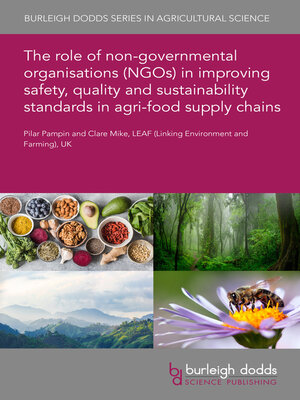The role of non-governmental organisations (NGOs) in improving safety, quality and sustainability standards in agri-food supply chains
ebook ∣ Burleigh Dodds Series in Agricultural Science
By Ms Pilar Pampin

Sign up to save your library
With an OverDrive account, you can save your favorite libraries for at-a-glance information about availability. Find out more about OverDrive accounts.
Find this title in Libby, the library reading app by OverDrive.



Search for a digital library with this title
Title found at these libraries:
| Library Name | Distance |
|---|---|
| Loading... |
The agri-food sector can be seen as one of the drivers of climate change-related problems whilst also being greatly affected by it. Sustainability standards have a role in promoting and supporting the uptake of sustainability practices, promoting agroecological farming and reducing the negative impact on the environment. Given the non-profit independent nature of non-governmental organisations (NGOs), they are in a key position for improving and enhancing the uptake of sustainability practices and standards. This chapter explores the role of NGOs in improving sustainability standards in the agri-food supply chain. The main roles identified are collaboration, lobbying, accountability and credibility, providing subject matter expertise, facilitating knowledge exchange, setting standards, providing incentives and communicating to a range of stakeholders. Case studies from Linking Environment and Farming (LEAF) are used to showcase how each role can be implemented. The chapter also identifies and discusses key challenges.







